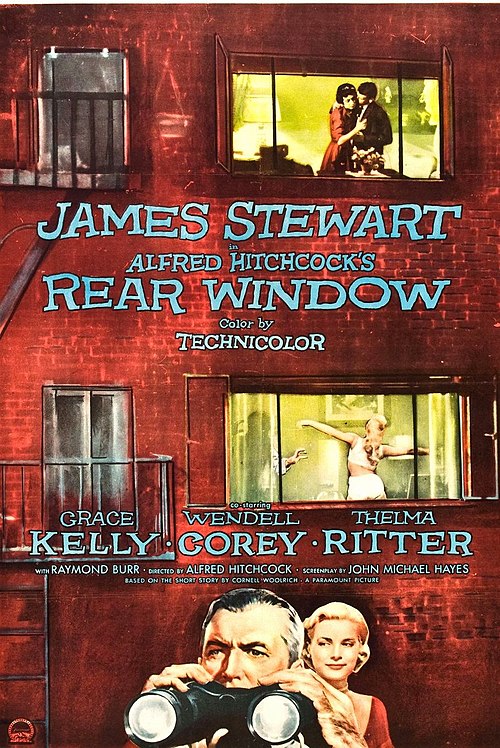
Rear Window
Description
Rear Window is a 1954 American mystery thriller film directed by Alfred Hitchcock and written by John Michael Hayes, based on Cornell Woolrich's 1942 short story "It Had to Be Murder". Originally released by Paramount Pictures, the film stars James Stewart, Grace Kelly, Wendell Corey, Thelma Ritter, and Raymond Burr. It was screened at the 1954 Venice Film Festival in competition for the Golden Lion.
Rear Window is considered by many filmgoers, critics, and scholars to be one of Hitchcock's best films, as well as one of the greatest films ever made. It received four Academy Award nominations, and was ranked number 42 on AFI's 100 Years...100 Movies list and number 48 on the 10th-anniversary edition, and in 1997 was added to the United States National Film Registry in the Library of Congress as being "culturally, historically, or aesthetically significant."
The film was made with a budget of $1 million ($11.7 million in 2024), and grossed $27 million during its initial release ($316 million in 2024).
Professional photojournalist and fashion photographer L.B. "Jeff" Jefferies, recuperating from serious injuries from his waist to his foot, is restricted to a wheelchair in his Greenwich Village apartment. His mid-floor rear window looks out onto a courtyard with small garden plots and other apartments in the surrounding blocks. Jeff is regularly visited by Stella, a cynical, middle-aged nurse, and his idealistic young girlfriend Lisa Fremont, a model and socialite.
During an intense heat wave, Jeff watches his neighbors through their open windows, including a professional dancer coined "Miss Torso", a songwriter with writer's block, and traveling costume jewelry salesman Lars Thorwald, who is hen-pecked by his bedridden wife. One night, Jeff hears a woman scream followed by the sound of breaking glass. Later that night, Jeff wakes as a thunderstorm breaks. He observes Thorwald making repeated half-hour excursions outside carrying his aluminum sample case. Later still, after Jeff has fallen asleep, Thorwald is seen leaving his apartment along with a woman obscured by a large black hat.
The next morning, Jeff notices Thorwald's wife is gone, and sees him cleaning a large knife and handsaw. Thorwald also has movers haul away a large trunk. After digging out his binoculars and then a camera with a high-power telephoto lens, a suspicious Jeff starts closely observing Thorwald's activities. He becomes convinced that Thorwald has murdered his wife, and tells first Stella, who becomes morbidly interested in the case, and then Lisa, who doubts him until they notice that Thorwald's wife is no longer in bed and the mattress is rolled up.
Jeff calls detective Tom Doyle and requests that he investigate Thorwald. A very skeptical Doyle investigates extensively and finds nothing suspicious, offering that Thorwald had sent his wife on a vacation upstate. Jeff and Lisa are at first convinced by this story and question their "rear window ethics". Later that night, however, the dog belonging to the neighbor one floor up from the Thorwalds is found dead in the courtyard. The dog's alarmed owner yells, drawing the attention of everyone except Thorwald, who Jeff observes is sitting silently in his dark apartment. Now convinced his theory is true, Jeff has Lisa pull out some slides taken two weeks earlier and notices that Thorwald had dug up his garden in the interim, possibly to bury his wife's body.
The following night, Jeff telephones and lures Thorwald away from his apartment to allow Lisa and Stella to investigate Thorwald's flower bed where the dog had been digging. Nothing is found, but Lisa climbs into Thorwald's apartment and searches it. Stella hurries back to Jeff.
Below Thorwald's apartment, Jeff and Stella are distracted watching a lower ground floor neighbor – coined "Miss Lonely-Hearts" – contemplating an overdose, and they call the police. The songwriter has finally finished his song "Lisa" and plays it loudly, causing Miss Lonely-Hearts to not go through with her suicide attempt. As they wait, Thorwald unexpectedly returns early and catches Lisa on his property. The operator finally connects them with the police and Jeff reports there is a man assaulting a woman at Thorwald's apartment. The police arrive to intervene as the pair scuffles. During their questioning, Lisa signals to Jeff that she is wearing Mrs. Thorwald's wedding ring. Thorwald sees this and realizes Jeff is surveilling his apartment.
Jeff phones Doyle and leaves an urgent message while Stella goes to bail Lisa out of jail. Thorwald locates and attacks Jeff in his darkened apartment, his only defense being camera flash bulbs. While grappling, Doyle and other officers storm the courtyard – followed by Lisa and Stella – and arrest Thorwald just as he drops Jeff out of his window. Thorwald confesses to his wife's murder to the police.
A few days later, the heat wave has broken and life in the apartment complex has returned to normal. Miss Lonely-Hearts is seen in a semi-romantic position with the songwriter in his studio apartment. Jeff, having broken his other leg in the fall, is still wheelchair-bound, now with casts on both legs. Lisa is seen stretched out next to him, wearing a much more casual outfit and reading a travel book. After noticing Jeff asleep, she puts down the book on exploration titled Beyond the High Himalayas and turns instead to read Harper's Bazaar.
Uncredited
Cast notes
Rear Window is filmed almost entirely within Jeff's apartment and from his near-static point-of-view at his window. In Laura Mulvey's essay "Visual Pleasure and Narrative Cinema," she identifies what she sees as voyeurism and scopophilia in Hitchcock's movies, with Rear Window used as a prime example of how she sees cinema as incorporating the patriarchy into the way that pleasure is constructed and signaled to the audience. Additionally, she sees the "male gaze" as especially evident in Rear Window in the portrayal of characters such as the dancer "Miss Torso", who is a spectacle for both Jeff and the audience (through his substitution) to enjoy.
In his 1954 review of the film, François Truffaut suggested "this parable: The courtyard is the world, the reporter/photographer is the filmmaker, the binoculars stand for the camera and its lenses."
John Fawell notes in Dennis Perry's book Hitchcock and Poe: The Legacy of Delight and Terror that Hitchcock "recognized that the darkest aspect of voyeurism ... is our desire for awful things to happen to people ... to make ourselves feel better, and to relieve ourselves of the burden of examining our own lives." Hitchcock challenges the audience, forcing them to peer through his rear window and become exposed to, as Donald Spoto calls it in his 1976 book The Art of Alfred Hitchcock: Fifty Years of His Motion Pictures, the "social contagion" of acting as voyeur.
In his book Alfred Hitchcock's "Rear Window", John Belton further addresses the underlying issues of voyeurism which he asserts are evident in the film. He says "Rear Window's story is 'about' spectacle; it explores the fascination with looking and the attraction of that which is being looked at."
In an explicit example of a condemnation of voyeurism, Stella expresses her outrage at Jeffries' voyeuristic habits, saying, "In the old days, they'd put your eyes out with a red hot poker" and "What people ought to do is get outside and look in for a change."
With further analysis, Jeff's positive evolution understandably would be impossible without voyeurism—or as Robin Wood puts it in his 1989 book Hitchcock's Films Revisited, "the indulging of morbid curiosity and the consequences of that indulgence."
The screenplay, which was written by John Michael Hayes, was based on Cornell Woolrich's 1942 short story It Had to Be Murder. However, in 1990 the question as to who owned the film rights of Woolrich's original story went before the Supreme Court of the United States in Stewart v. Abend. Although the film was copyrighted in 1954 by Patron Inc. by a production company set up by Hitchcock and Stewart, a subsequent rights holder refused to acknowledge previous rights agreements. As a result, Stewart and Hitchcock's estate became involved in the Supreme Court case. Its outcome led to the litigant, Sheldon Abend, becoming credited as a producer of the 1998 remake of Rear Window.
The film was shot entirely at stage 17 at Paramount Studios which included an enormous indoor set to replicate a Greenwich Village courtyard, with the set stretching from the bottom of the basement storeroom to the top of the lighting grid in the ceiling. The lighting was rigged with four interchangeable scene lighting arrangements: morning, afternoon, evening, and night-time. Set designers Hal Pereira and Joseph MacMillan Johnson spent six weeks building the extremely detailed and complex set, which ended up being the largest of its kind at Paramount. One of the unique features of the set was its massive drainage system, constructed to accommodate the rain sequence in the film. They also built the set around a highly nuanced lighting system which was able to create natural-looking lighting effects for both the day and night scenes. Though the address given in the film is 125 W. Ninth Street in New York's Greenwich Village, the set was actually based on a real courtyard located at 125 Christopher Street.
In addition to the meticulous care and detail put into the set, careful attention was also given to sound, including the use of natural sounds and music that would drift across the courtyard and into Jefferies' apartment. At one point, the voice of Bing Crosby can be heard singing "To See You Is to Love You," originally from the 1952 Paramount film Road to Bali. Also heard on the soundtrack are versions of songs popularized earlier in the decade by Nat King Cole ("Mona Lisa", 1950) and Dean Martin ("That's Amore", 1952), along with segments from Leonard Bernstein's score for Jerome Robbins' ballet Fancy Free (1944), Richard Rodgers's song "Lover" (1932), and "M'appari tutt'amor" from Friedrich von Flotow's opera Martha (1844), most borrowed from Paramount's music publisher, Famous Music.
Thanks to Wikipedia for this content
 Thanks to Yarik
for the idea of this Favorite
April 01, 2025
Thanks to Yarik
for the idea of this Favorite
April 01, 2025
 Abena
Abena
 Ingrid
Ingrid
 Luca Rossi
Luca Rossi
 Nguyen Van An
Nguyen Van An
 Omar Hassan
Omar Hassan
 Liam
Liam
 Alex Johnson
Alex Johnson
 Emily Davis
Emily Davis
 Hugo van Dijk
Hugo van Dijk
 Herbertseemn
Herbertseemn
 John Doe
John Doe
 Fuser
Fuser
 Jakub Nowak
Jakub Nowak
 Sven
Sven
 Freja Lindström
Freja Lindström
 Rajesh Patel
Rajesh Patel
 Jane Smith
Jane Smith
 Flora
Flora
 Filman
Filman
 Laura Moore
Laura Moore